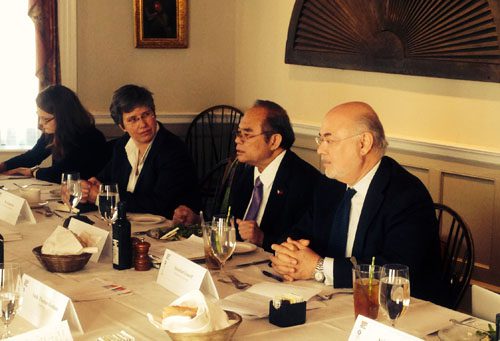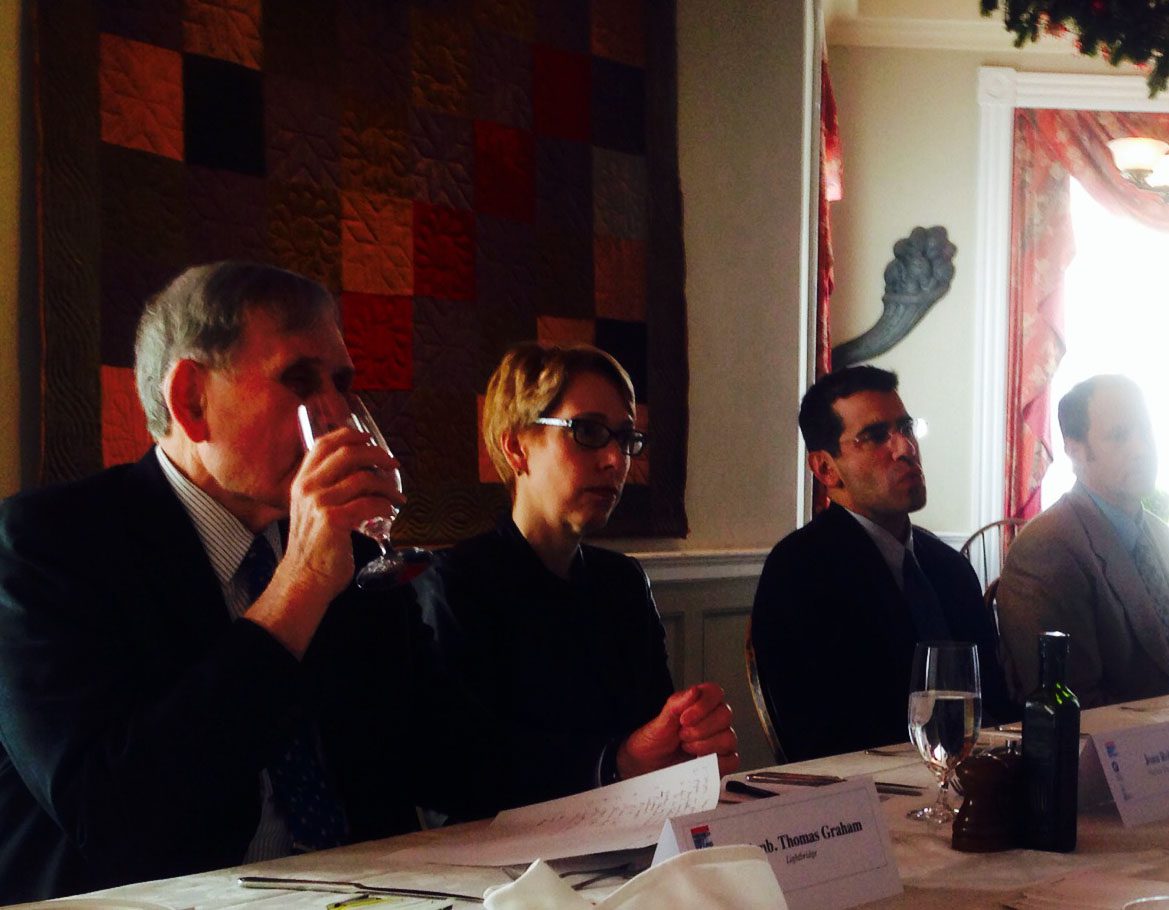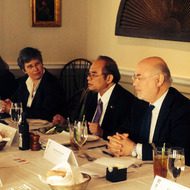On December 11, 2013, the Global Security Institute (GSI), in partnership with the Friedrich Ebert Stiftung (FES), hosted an informal roundtable discussion with presentations by Ambassador Libran Cabactulan of the Phillippines, President of the 2010 Review Conference of the Nuclear Non-Proliferation Treaty, and Ambassador Thomas Graham, Jr., former US diplomat now serving as Chairman of the Bipartisan Security Group. The discussion also included several highly prominent non-governmental experts, including Joan Rohlfing of the Nuclear Threat Initiative, Tom Collina of the Arms Control Association, Stephen Young of the Union of Concerned Scientists, Leonie Willenbrik of FES, and Aviva Kushner of GSI. Pia Bungarten, FES Representative to the United States, and Jonathan Granoff, GSI President, chaired the event.
 In her opening remarks, Pia Bungarten welcomed the gathering of like-minded individuals who “share interest, passion, for the kinds of solutions” that today’s integrated world requires. In his introductory remarks, Mr. Granoff heralded Ambassador Cabactulan’s “herculean effots” which led to the success of obtaining a strong final document at the 2010 NPT Review: “Through Ambassador Cabactulan’s leadership, the thirteen practical commitments of the NPT 2000 Review, which included an unequivocal undertaking [to achieve nuclear disarmament] were reaffirmed, and 64 very progressive similar steps were additionally obtained.”
In her opening remarks, Pia Bungarten welcomed the gathering of like-minded individuals who “share interest, passion, for the kinds of solutions” that today’s integrated world requires. In his introductory remarks, Mr. Granoff heralded Ambassador Cabactulan’s “herculean effots” which led to the success of obtaining a strong final document at the 2010 NPT Review: “Through Ambassador Cabactulan’s leadership, the thirteen practical commitments of the NPT 2000 Review, which included an unequivocal undertaking [to achieve nuclear disarmament] were reaffirmed, and 64 very progressive similar steps were additionally obtained.”
Jonathan Granoff suggested that diplomats who are stationed in Washington focus mainly on US bilateral relations issues, whereas diplomats from around the world representing their nations at the United Nations focus on global issues, including nuclear non-proliferation and disarmament. Therefore, he argued, there is value in the DC community hearing from UN diplomats. The public media informs UN diplomats regarding the limitations of political discourse in DC, but the political actors in DC are insufficiently sensitive to the global passions for progress on nuclear disarmament.
The success of 2010, Ambassador Cabactulan argued, was due in large part, not just to the considerable, year-and-a-half-long preparations that he and his team undertook, but also to the work of those who came before him. He cautioned, however, that while the “carefully selected” words of the 2010 final document may indicate success, “we are now entering 2014 and not much [by way of progress] can be reported.” This lack of progress leads him to question whether the NPT process is the way by which nuclear disarmament will be achieved. “After all,” he cautioned, “we have to be mindful of what Einstein said: that insanity is doing the same thing over and over again and expecting different results.”
 Cabactulan urged participants to remain “mindful” of the things “that really can be done,” and to identify “the stumbling blocks” that are preventing further progress. Despite the efforts and commitments, “we have not done anything in the Middle East,” he lamented. He worried that, if the 2015 Review Conference is a failure, the NPT’s core bargain will be placed at grave risk. He praised the work of civil society that forces governments to “think outside the box”, “pushes you to a certain level, certain heights, in a certain direction.”
Cabactulan urged participants to remain “mindful” of the things “that really can be done,” and to identify “the stumbling blocks” that are preventing further progress. Despite the efforts and commitments, “we have not done anything in the Middle East,” he lamented. He worried that, if the 2015 Review Conference is a failure, the NPT’s core bargain will be placed at grave risk. He praised the work of civil society that forces governments to “think outside the box”, “pushes you to a certain level, certain heights, in a certain direction.”
Ambassador Graham echoed Ambassador Cabactulan’s concerns, noting in the opening of his presentation that, without entry-into-force (EIF) of the Comprehensive Test-Ban Treaty (CTBT), he remains “pessimistic about the medium- to long-range survivability of the NPT.” The United States, he believes, remains the key obstacle to the CTBT’s EIF; if the US Senate ratifies the CTBT, Graham believes, the rest of the hold-outs will follow suit, the “uncertainties” of Iran and North Korea notwithstanding.
Ambassador Graham proposed that, as an interim step, the UN Security Council could adopt a resolution declaring any nuclear explosive test anywhere, at any time, as a threat to international peace and security. This proposal, first broached at the United Nations at a GSI informal luncheon event on October 28, 2013, would effectively strengthen the existing norm against nuclear testing and contribute to international customary law against such harmful tests, “securing,” he noted, “what is right now only voluntary.”
Other creative ideas were discussed in the broader discussion amongst the group, including forging ahead on areas where non-nuclear weapon states and nuclear weapon states agree, such as fissile material security and strengthening the technical systems addressing verification. All agreed that to engender further creative thinking, both the New York and Washington diplomatic communities must come together, with civil society and governmental agencies, to brainstorm and find creative approaches to challenges. Without innovational thinking leading to new routes forward, we may be, as Cabactulan warned, doomed to fulfill Einstein’s definition of insanity, much to the grave insecurity of us all.
Read the full transcript of Ambassador Cabactulan’s remarks.
Jonathan Granoff is the President of the Global Security Institute, a representative to United Nations of the World Summits of Nobel Peace Laureates, a former Adjunct Professor of International Law at Widener University School of Law, and Senior Advisor to the Committee on National Security American Bar Association International Law Section.







